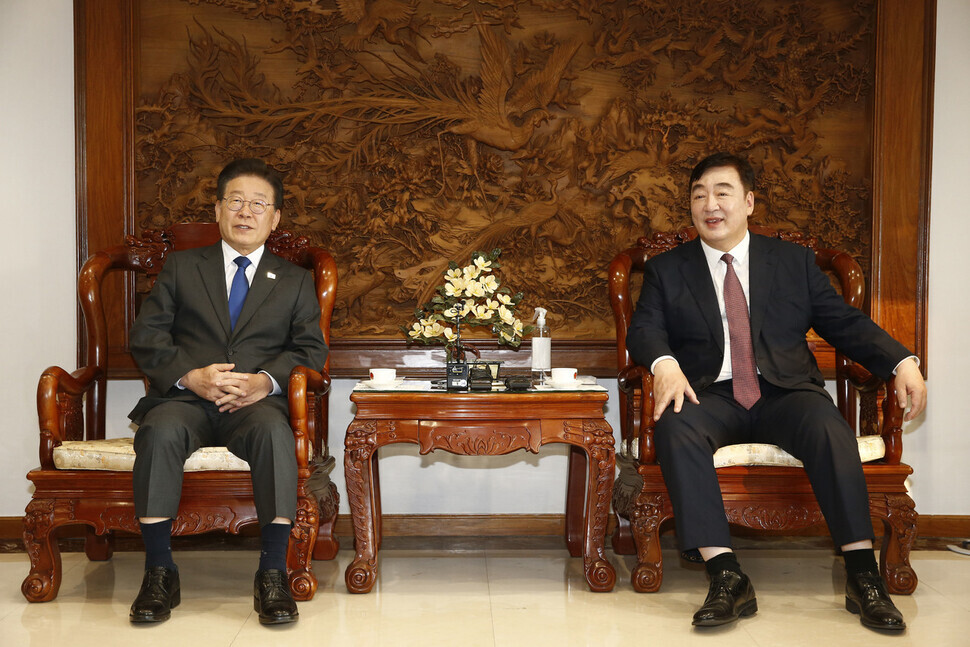hankyoreh
Links to other country sites 다른 나라 사이트 링크
[Editorial] Diplomatic impropriety on all fronts

On Thursday evening, China’s ambassador to South Korea invited the leader of South Korea’s Democratic Party to his official residence in Seoul.
“Some are betting that the US would be victorious over China if it pressured China with all its might,” Ambassador Xing Haiming said, warning that “anyone who is currently betting on China’s defeat will certainly come to regret that.”
He went on to express hopes that “South Korea will extricate itself from external obstacles in its dealings with China” — sending the clear message that his remarks were meant in reference to South Korea.
The first interpretation of Xing’s remarks is as an expression of strong discontent over the Yoon Suk-yeol administration’s diplomatic activities, which have been skewed in the direction of the US.
Diplomats are certainly within their rights to express positions about another country’s government from the perspective of their own national interest. But this was not the scene of some negotiation, and there are certain lines that must not be crossed when making public statements.
Xing’s remarks were unusually high-handed to be characterized as a “public statement.” They sounded like a threat of Chinese retaliation if South Korea does not take Beijing’s side.
It also goes against diplomatic practice to buttonhole an opposition party leader who is visiting the ambassador’s residence to discuss bilateral cooperation on the Fukushima nuclear power plant contaminated water issue, and to instead subject him to a more than 10-minute open denunciation of the host country’s government.
If Beijing has a message to express to the administration, its first step should be to discuss things closely and directly through diplomatic channels. This was unquestionably a major breach of etiquette.
It’s also the sort of attitude that can stir up antipathy even among the South Koreans who are critical of the Yoon administration’s foreign policy.
Ambassadors should be striving to maintain good relationships with the public in their host country — yet this was a case of one doing damage to cordial relations. It’s enough to make you suspect Xing’s remarks that day were really meant as a show for China’s President Xi Jinping.
Lee Jae-myung, for his part, needs to recognize the need for a more circumspect and closely thought-out approach to his diplomatic activities.
As the leader of the party with a majority of National Assembly seats, he has no reason not to engage in active diplomatic discussions. And with the ruling People Power Party so one-sidedly taking Japan’s position on the Fukushima water dumping issue, the opposition party is within its rights to request China’s cooperation to uphold the national interest.
Even so, it was not appropriate for an opposition party leader to visit the ambassador’s residence in person, especially at a sensitive movement such as now. The fact that he broadcast the visit live on the party’s YouTube channel leaves him wide open for critics to accuse him of trying to exploit diplomacy for political ends.
When practicing diplomacy with a powerful country, the correct forms and content need to be in place based on protocol.
Meanwhile, the People Power Party needs to stop using diplomacy in attacks on the opposition party, as we’ve seen with lawmaker Kim Gi-hyeon’s “backup dancer” remarks or fellow lawmaker Shin Won-sik’s talk about “China flunkeyism.”
Both the ruling and opposition parties should jettison the idea of exploiting diplomacy to serve domestic political purposes. They need to approach more objectively while prioritizing the national interests and stature.
Please direct questions or comments to [english@hani.co.kr]

Editorial・opinion
![[Column] Tariffs on China: Trump was dumb, Biden dumber [Column] Tariffs on China: Trump was dumb, Biden dumber](https://flexible.img.hani.co.kr/flexible/normal/500/300/imgdb/original/2024/0520/191716191153918.jpg) [Column] Tariffs on China: Trump was dumb, Biden dumber
[Column] Tariffs on China: Trump was dumb, Biden dumber![[Column] What if Seoul took reunification by force off the table? [Column] What if Seoul took reunification by force off the table?](https://flexible.img.hani.co.kr/flexible/normal/500/300/imgdb/original/2024/0520/3017161928630494.jpg) [Column] What if Seoul took reunification by force off the table?
[Column] What if Seoul took reunification by force off the table?- [Editorial] Intensifying US-China rivalry means Seoul must address uncertainty with Beijing sooner than later
- [Column] When ‘fairness’ means hate and violence
- [Editorial] Yoon must stop abusing authority to shield himself from investigation
- [Column] US troop withdrawal from Korea could be the Acheson Line all over
- [Column] How to win back readers who’ve turned to YouTube for news
- [Column] Welcome to the president’s pity party
- [Editorial] Korea must respond firmly to Japan’s attempt to usurp Line
- [Editorial] Transfers of prosecutors investigating Korea’s first lady send chilling message
Most viewed articles
- 1Xi, Putin ‘oppose acts of military intimidation’ against N. Korea by US in joint statement
- 2Kim Jong-un wanted to meet with residents of shelled Yeonpyeong Island in South, Moon recalls in mem
- 3For new generation of Chinese artists, discontent is disobedience
- 4Berlin mayor hints at tearing down ‘comfort women’ memorial in city
- 5[Column] What if Seoul took reunification by force off the table?
- 6To weigh costs and benefits, Korea must stop treating US troop presence as a sacred cow
- 7[Column] Tariffs on China: Trump was dumb, Biden dumber
- 8China, Russia put foot down on US moves in Asia, ratchet up solidarity with N. Korea
- 9Putin’s trip to China comes amid 63% increase in bilateral trade under US-led sanctions
- 10[Exclusive] Unearthed memo suggests Gwangju Uprising missing may have been cremated